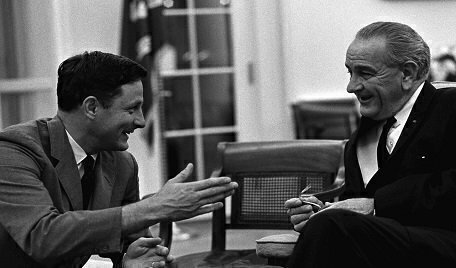In this excerpt from The Atlantic, Jeffrey Rosen explains how nothing in the 25th amendment stops the vice president, Cabinet, and Congress from determining the president is “unable" to hold office, as a political decision.
Last week, in The New York Times, Ross Douthat became the latest and perhaps most prominent advocate of using the 25th Amendment to remove President Donald Trump from office. Section 4 of the 25th Amendment allows the vice president and a majority of the Cabinet to recommend the removal of the president in cases where he is “unable to discharge the powers and duties of his office,” and allows the House and Senate to confirm the recommendation over the president’s objection by two-thirds vote. Douthat argued that the Amendment should be invoked to stop what he calls a “childish president” who is unfit for office and who is unlikely to be impeached.
 The response to Douthat’s suggestion was mixed. Jamal Greene argued for a broad reading of the amendment to remove “a compulsively lying President would be ‘unable to discharge the powers and duties of his office.’” On the other hand, Jonathan Bernstein at Bloomberg, Ian Tuttle in National Review, and John Daniel Davidson at The Federalist concluded, in different ways, that for elites to invoke a contested interpretation of the 25th Amendment to remove the president would trigger a political crisis. Slate’s Dahlia Lithwick, in her summary of the 25th Amendment commentary, argued that “the most practical problem with the 25th Amendment option is that it won’t happen. The selfsame Cabinet and vice president tasked with assessing the president are still enabling him.”
The response to Douthat’s suggestion was mixed. Jamal Greene argued for a broad reading of the amendment to remove “a compulsively lying President would be ‘unable to discharge the powers and duties of his office.’” On the other hand, Jonathan Bernstein at Bloomberg, Ian Tuttle in National Review, and John Daniel Davidson at The Federalist concluded, in different ways, that for elites to invoke a contested interpretation of the 25th Amendment to remove the president would trigger a political crisis. Slate’s Dahlia Lithwick, in her summary of the 25th Amendment commentary, argued that “the most practical problem with the 25th Amendment option is that it won’t happen. The selfsame Cabinet and vice president tasked with assessing the president are still enabling him.”
It’s true that the use of Section 4’s involuntary-removal mechanism for the first time in American history—especially for a president who is not ill and who still has public support—could trigger a political crisis. Still, the constitutional test of the president’s being “unable to discharge the powers and duties” of the office was intended to be vague and open-ended. In 1995, Senator Birch Bayh (pictured, with Lyndon Johnson), the father of the 25th Amendment, quoted President Dwight Eisenhower, whose illness had helped to precipitate the drafting of the amendment, in support of the proposition that “the determination of the president’s disability is really a political question.”
In other words, both the president whose disability inspired the 25th Amendment and the senator who helped to draft it viewed the definition of “disability” under the Amendment not as a medical decision, left to doctors, but a political decision, left to the vice president, the Cabinet, and ultimately Congress. If, at some point in the future, those officers decide it is more politically advantageous for the Republican Party to remove Trump under the 25th Amendment than to allow him to be impeached for obstruction of justice, nothing in the text or original understanding of the Amendment would prevent them from doing so.
To read the entire analysis of this issue, read Rosen's entire on story at The Atlantic at: https://www.theatlantic.com/politics/archive/2017/05/presidential-disability-is-a-political-question/527703/







